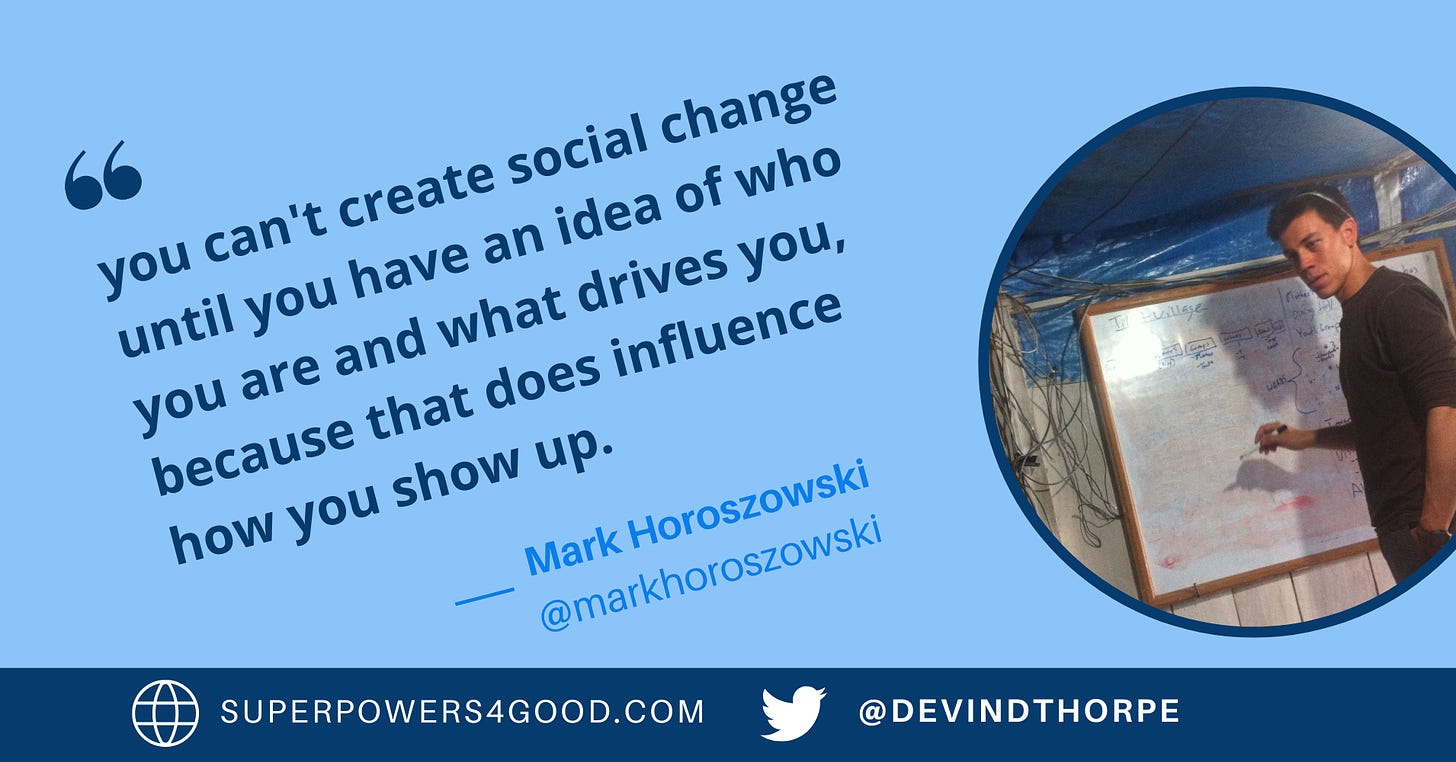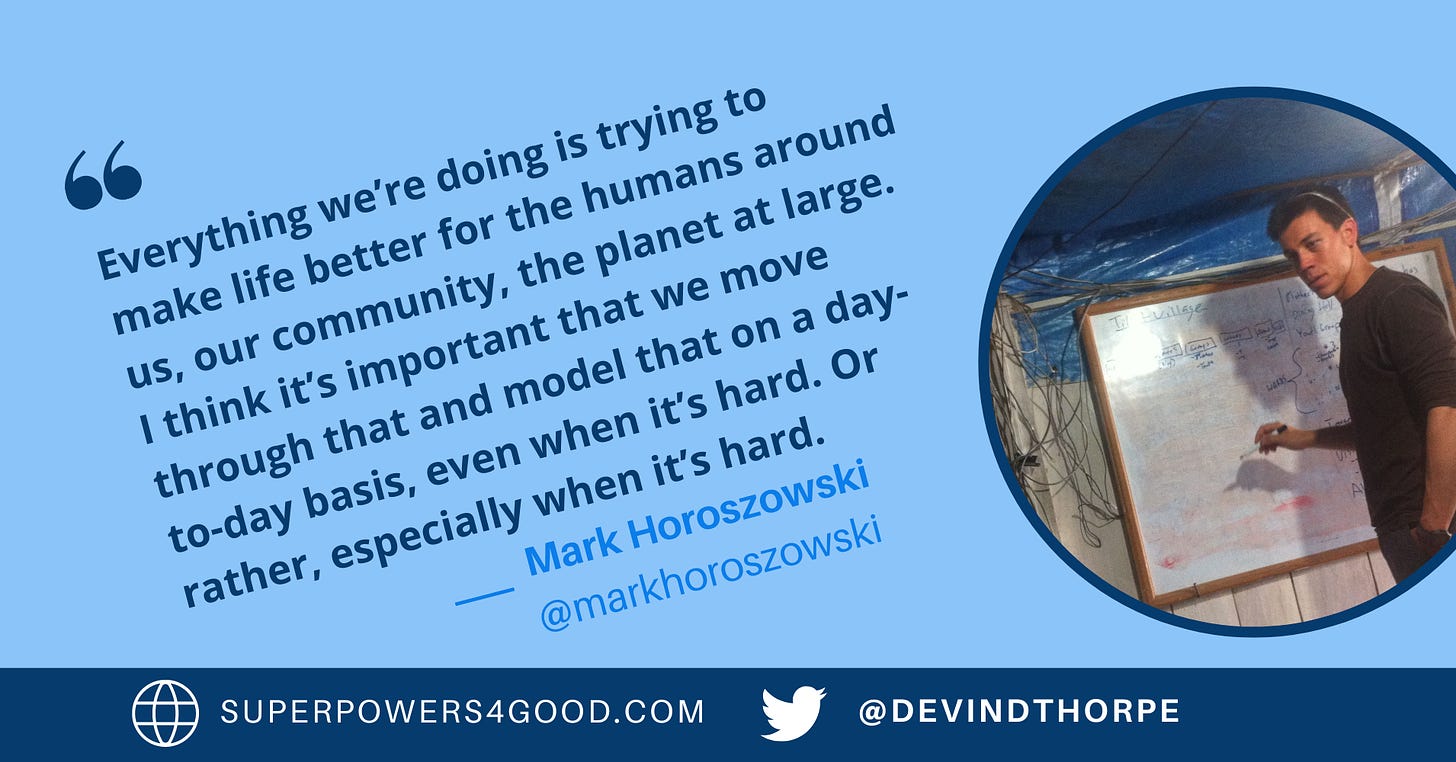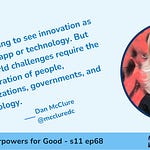When you purchase an item after clicking a link in this post, we may earn a commission.
Devin: What is your superpower?
Mark: You need to design a culture that’s best for your organization to grow and scale and create an impact and be an amazing place to work. Some of my natural tendencies, I’ll be honest, don’t lead to that.
The reason I share that is to say, I think what I’ve learned—and it’s taken a while to get there—but it’s a superpower that I’ve developed or am still developing. How I naturally show up, how I naturally react, how I naturally communicate and collaborate that actually aren’t in the best service of our mission and of—and I think most importantly—of the people that are a part of my team.
If I can learn about what that is, if I can really listen, manage my emotions in that process and actually kind of change the way that I show up for my different team members. That’s hard work. You’re changing some of your emotional reactions. But I think that’s it for me, being able to work through that discomfort, even if it takes a long time. Keep learning. Then I can get out of the way of the amazing team members that I have and let them grow.
Mark Horoszowski, CEO of MovingWorlds, and I first connected seven years ago. His relatively simple experteering platform that matched expert volunteers with nonprofits and social enterprises that needed support has blossomed into a significant corporate training and career development program.
Leveraging the matching program, MovingWorlds offers programs to corporations that help them internalize a genuine ESG ethos. At the same time, the experteering social enterprise has established an institute that trains people for careers in social impact.
Experience taught Mark a great deal. “The reason people were experteering was beyond altruism,” he says. Often, experteers were looking to test ideas for their own social enterprise or shift their careers toward impact. Corporations often sponsored their executives because of what they would learn and bring back to the business.
It made sense to create the institute program to provide robust social impact training about human-centered design, impact investing and sustainability. Built around an experteering role that might be either temporary full-time or longer-term part-time, the training puts experiential learning in a more complete context.
Corporations can now work with MovingWorlds to design programs that draw on courses created for the institute to get precisely the content needed to further corporate objectives, always incorporating some experteering feature.
Mark shared a couple of examples. The first, from the perspective of a social enterprise, Arqlite (in which I have coincidently invested):
They take waste, found plastic, they turn it into smart gravel. They've got investors; they've been through an accelerator model and they've realized that one of their paths through growing their impact and scale is direct to consumer product. Sure. But also direct to business products.
They just announced a new partnership with CEMEX where their smart gravel will actually be kind of a filler, if you will, a less environmentally intensive and plastic sequestering filler into construction materials.
Building that type of commercial partnership is very, very hard. You need connections. You need to speak the language. In order to go through procurement with corporate sectors, you need to understand master services agreements. You probably need to be compliant with certain legal requirements, insurance requirements. That's a hard road to walk.
So, what we do is we help these social enterprises build the connections, get inside our connections at companies like an SAP, like Home Depot, move into places so they can build those commercial relationships and then upskill not only the founder, but I think more importantly, the team behind the founder in things like operations, in customer success, in accounting, in H.R.
But if you're still in early-stage social enterprise, still working through that pioneer gap, you're still trying to find product market fit. You don't have enough resources to do that training to hire people who have already been experts. So we provide that capacity boost. We might train one team member, mentor another, and then give you a team of experts from SAP to help you with your licensing model or something else.
On the social enterprise side, it's that direct skills-based support to overcome challenges and also giving you some inside connections at places that you might just not have.
The value of connections and expertise at young companies like Arqlite are easy to understand.
Mark shared an example of a corporate program with SAP.
One of the programs that we just operated with SAP was the way they had a small team of people going through a leadership development program for business professionals.
These teams of people worked with companies like Arqlite, like Blue Dot, like Vega Coffee, right? Really cool and growing social enterprises and help them work on everything from developing their sales pitch to their sales content to their licensing model, pricing strategy and more.
Now, what happens with these professionals before engaging with the social enterprise? They're getting a kind of crash course on what social entrepreneurship is. Why do companies care? Why does SAP care? So these up and coming leaders are learning from a strategic perspective, why our CEO is talking about the importance of sustainability and social equity at our company.
They're seeing that from the business side of things. They're learning about impact investing. They're learning about systems thinking.
So, yes, they can help this social enterprise, but also so they can take these insights back into the business.
Mark notes that an unnamed corporation—not SAP—had a particularly powerful experience. The company representative saw how its AI algorithm had “built-in racism.” It could quickly identify middle-aged white men but struggled to identify a Black man with an accent. The representative was able to go back to the product teams to address the problem.
“That person led major accessibility initiatives at this organization, which resulted in one of the biggest government contracts ever related to accessibility with the government of Canada—the federal government,” Mark says.
Throughout the growth of MovingWorlds, Mark has leveraged his unusual superpower, a willingness to change his behavior and manage his emotions for the benefit of others on his team. Let’s call it “self-management.”
How to Develop Self-Management As a Superpower
Mark is deliberate about managing himself. He credits two books with helping him discover tools that help:
“The core thesis of these was emotions are learned—a learned skill,” Mark says. “We adopt these from the culture of the society, the people that were around. And that changes over time.”
MovingWorlds includes an essential measure of self-reflection in the institute. Mark says:
One of the premises that we start with is you can't create social change until you have an idea of who you are and what drives you, because that does influence how you show up.
Are you doing it for ego or are you doing it for impact? You're doing it to honor somebody. Whatever your motivation is, it will influence how you show up.
Mark continues, “Understanding self is answering some of the big questions in life like:
Who are you?
What are your first principles?
Why are you here?
“Then adopting rituals that help you move through every day in line with that,” he says.
Mark shared some insights about his personal routine, designed to help him manage himself.
For me personally, I can tell you that that's wake up, don't look at my phone, take a deep breath, put my feet on the floor, ground myself, set intention for the day, go chug a glass of water, with intention. It's something that I'm doing for myself.
Then at some point during the day, I've got to exercise. I've got to move the body. And at another point in the day, I've got to do some type of mindfulness. It can be a breathing exercise. It can be a slow walk. But I've got to do something. So, start with that self.
Mark applies human-centered design principles to his approach to the day. “My job then is to move through all those processes:”
Build empathy
Define the problem or the job to be done
Ideate different solutions
Prototype something
Test
He describes how he applies these principles to interactions with team members:
That shows up in how I'll work with the team member, like, “Hey, I think the issue is maybe when I show up in this way, it maybe makes somebody feeling a little bit diminished in their work because I'm giving too many ideas. So what's my job to be done? The job that I need to do is adopt more of a coaching posture and let that person really identify some of their own ideas because it's important for that person.
My other teammate might love my ideas. That's like brainstorming. That's why they come to me. But it's different.
Then try it. Adopt more of a coaching posture on a call and then test. Did that work better? Ask for that feedback.
He seeks to apply that process routinely.
Mark sees it as vital for social entrepreneurs. “Everything we’re doing is trying to make life better for the humans around us, our community, the planet at large. I think it’s important that we move through that and model that on a day-to-day basis, even when it’s hard. Or rather, especially when it’s hard.”
By following Mark’s example and counsel, you can make self-management a superpower that enables you to do more good in the world.
























How Experteering Makes the World Better